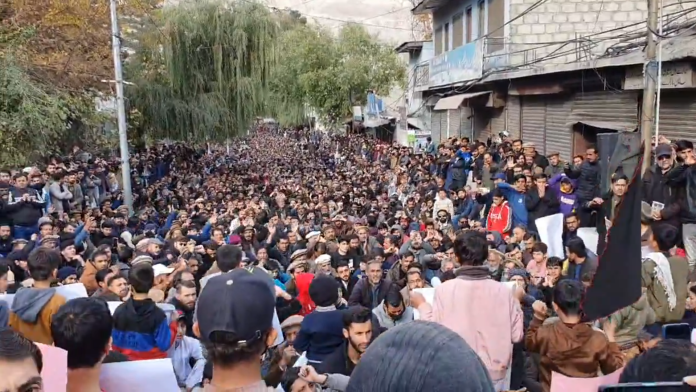The Karakoram Highway (KKH), a crucial artery connecting Rawalpindi with Pakistan-occupied-Gilgit-Baltistan (POGB), remained blocked for the second consecutive day as members of the Muttahida Kohistan Jirga continued their protest demanding the release of elder Maulana Kareemdad.
The demonstration, which began on Wednesday, resumed at 8 a.m. Thursday in the Pattan area of Lower Kohistan, severely disrupting traffic on the KKH. Starting December 9, a sit-in will be held on the highway, leading to its complete closure.
Protesters from Upper Kohistan, Lower Kohistan, and Kolai-Palas have united in the blockade, vowing to maintain it until their demands are met. Former Member of the Provincial Assembly (MPA) Maulana Dildar said, “We will not end our protest until the district administration releases Maulana Kareemdad and resolves all pending issues, including road reconstruction.”
Although the jirga temporarily lifted the blockade overnight to allow stranded travelers to proceed, they resumed it Thursday morning, with further plans to extend the protest into Upper Kohistan.
The jirga has allowed limited passage for vehicles, granting access for one hour after Zuhr and Asr prayers. The jirga has refused to engage with the police and Wapda officials. Instead, they convened their own meeting to decide the next course of action.
In a show of strength, the jirga expanded its membership from 45 to 90, with equal representation from all districts.
The arrest of Maulana Kareemdad, a former National Assembly candidate, alongside contractor Aurangzeb, has fueled tensions in the region. Both men have been transferred to Haripur prison, a move that protesters see as unjust and provocative. The Paki establishment’s deliberate strategy to suppress the region—economically, politically, and socially—is a stark reminder of its exploitative agenda. For the people of PoGB, the path forward lies in resistance, as their voices grow louder in demanding autonomy, dignity, and justice.

